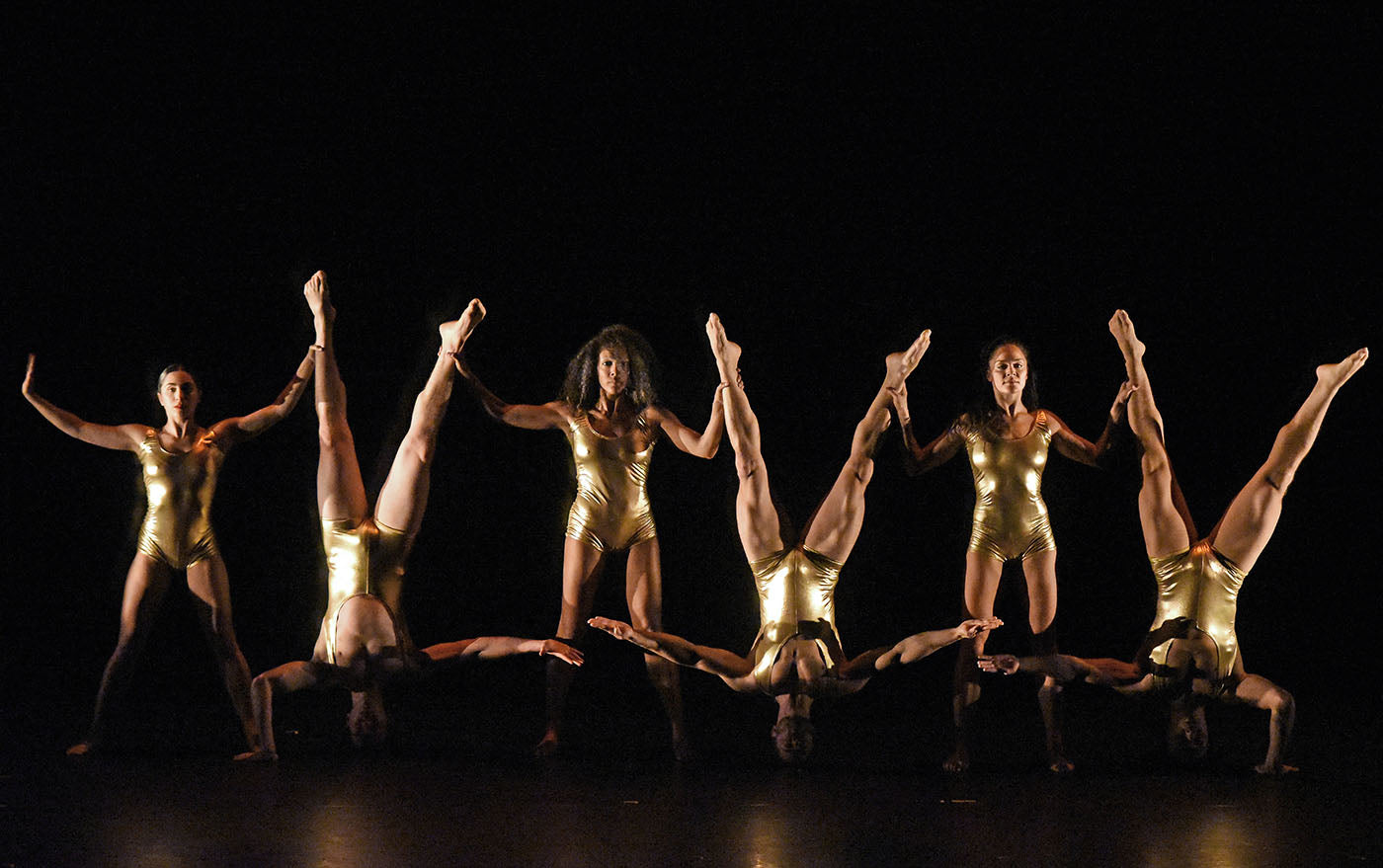Indeed, his credits cover all mediums, including choreographing 800 dancers for the opening ceremony of the 2014 Olympics in Sochi. There have also been arena shows working with rock royalty, such as U2 and Sting, as well as creating the dance theater work, “Pearl,” based on the Pulitzer Prize-winning author, Pearl S. Buck, which debuted at Lincoln Center last year and will be mounted in Montreal and Toronto this summer.
Ezralow, who grew up near the Wallis, with his eight-member troupe, Ezralow Dance now L.A.-based, is clearly a local boy who made good.
With “Open,” choreographed in 2012, the artist has seamlessly melded music, movement and visuals into a 15-scene work that is audience-friendly, or what the choreographer refers to as the ‘A’ word—accessible. Themes, such as ecology, nature, businessmen run amok and dancers reveling in a riot of colors, course through the production that features videos by Luca Parmigiana, Ezralow, his wife, associate artistic director, Arabella Ezralow, and Marc Rosenthal.
Set to music by a bevy of classical composers—perennial favorites including Beethoven, Debussy, Bach and Albinoni—the work showcased an octet of polished dancers that proved eminently watchable, their athletic prowess also on full display. Marching briskly with briefcases to Khachaturian’s manic “Sabre Dance,” the Mad Men-esque movers executed dipping turns and frenzied walks in “Biz Men,” before the taped score simmered into a Chopin Nocturne, wherein Patrick Cook found himself alone with a fetching mermaid, Kelsey Landers, in “Kelp Dreams.”
Their duet offered aggressive lifts, neo-acrobatic moves and yes, an apt, er, fish dive, before morphing into “Clean Up,” a broom-sweeping affair ironically set to the choral finale of Beethoven’s Ninth Symphony. Each scene blended into the next, courtesy of four sliding panels, which were manoeuvred by the dancers themselves. As if performing and changing costumes (a plethora of shirtwaist dresses, suits and ties, sexy gold lamé dance togs and the like, credited to American Apparel, Marsha Brady and Constance Hoffman), weren’t enough, the dancers’ timing had to be split-second in order for the show to triumph.
Other scenes included “AFGO,” an acronym for “Another F***ing Growth Opportunity,” Ezralow’s ribald take on marriage that featured a couple at the altar only to then squabble within the confines of—what else—a boxing ring. The imagery continued, with text (“Life” “Cycle”) and arrows pointing up, segueing into the sketch, “Three Fates.”
Here, a stellar Re’Sean Pates wielded a bouquet of balloons in a number performed to Tchaikovsky’s “Dance of the Sugar Plum Fairy,” a low-tech fantasia of sorts that was, alas, hindered by being too dark (lighting design by Dan Weingarten).
The solo, “Carmen,” although beautifully danced by a riveting Anthea Young, was undermined by her use of finger puppets, which were hard to read, leaving her self-inflicted death moment something less than tragic.
But this terpsichorean train kept on rolling, with Ezralow making use of Prokofiev’s music from “Romeo and Juliet,” setting the “Black and White” scene to the familiar sounds of “Dance of the Knights,” the dueling sides offering articulated footwork and crisply mechanized hand and arm gestures. And in a lovely nod to Nijinsky, Debussy’s work for flute, “Syrinx,” accompanied the dancers in preening and lunging modes, the vignette resembling a tableau from a Greek frieze.
Confirming the Einstein adage that “dancers are the athletes of God,” the three couples of “Olympiads” offered head and handstands (resembling inverted Rockettes), a series of bodybuilding poses, and men fearlessly spinning women, a scene that morphed into full-throttle gumbooting (a genre derived from South African gold mine workers), in “Stepping Stones.” Who knew that this exuberant display of foot-stomping unisons could work so well to a Bach Brandenburg Concerto, with the dancers, decked out in construction garb, also doing a bit of Groucho walking.
“Open” closed with “Chroma” (no relation to Wayne McGregor’s dance of the same name), a romp with the full company, attired in what could be the “United Colors of Benetton.” With Strauss’ “Blue Danube Waltz” as musical backdrop, this testament to the apotheosis of playfulness featured dancers racing back and forth behind a pair of panels, their human and projected selves conjuring some aah-worthy visual sorcery.
In an encore that dared one to sit still—the tune was Bruno Mars’ “Uptown Funk,” after all—each indefatigable dancer, including Santo Giuliano, Kelly Allen, Isaac Huerta and Vanessa Treviño, busted out in solo jumps, dizzying turns and jiggy hip-hop moves.
The ‘A’ word, not so bad when you consider the alternative, decidedly ruled here, where a good time was had by all.









comments